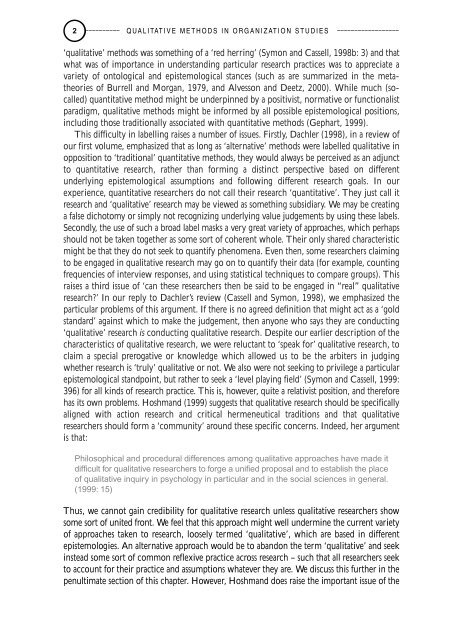essential-guide-to-qualitative-in-organizational-research
essential-guide-to-qualitative-in-organizational-research
essential-guide-to-qualitative-in-organizational-research
- No tags were found...
Create successful ePaper yourself
Turn your PDF publications into a flip-book with our unique Google optimized e-Paper software.
2 –––––––––– QUALITATIVE METHODS IN ORGANIZATION STUDIES ––––––––––––––––––‘<strong>qualitative</strong>’ methods was someth<strong>in</strong>g of a ‘red herr<strong>in</strong>g’ (Symon and Cassell, 1998b: 3) and thatwhat was of importance <strong>in</strong> understand<strong>in</strong>g particular <strong>research</strong> practices was <strong>to</strong> appreciate avariety of on<strong>to</strong>logical and epistemological stances (such as are summarized <strong>in</strong> the metatheoriesof Burrell and Morgan, 1979, and Alvesson and Deetz, 2000). While much (socalled)quantitative method might be underp<strong>in</strong>ned by a positivist, normative or functionalistparadigm, <strong>qualitative</strong> methods might be <strong>in</strong>formed by all possible epistemological positions,<strong>in</strong>clud<strong>in</strong>g those traditionally associated with quantitative methods (Gephart, 1999).This difficulty <strong>in</strong> labell<strong>in</strong>g raises a number of issues. Firstly, Dachler (1998), <strong>in</strong> a review ofour first volume, emphasized that as long as ‘alternative’ methods were labelled <strong>qualitative</strong> <strong>in</strong>opposition <strong>to</strong> ‘traditional’ quantitative methods, they would always be perceived as an adjunct<strong>to</strong> quantitative <strong>research</strong>, rather than form<strong>in</strong>g a dist<strong>in</strong>ct perspective based on differentunderly<strong>in</strong>g epistemological assumptions and follow<strong>in</strong>g different <strong>research</strong> goals. In ourexperience, quantitative <strong>research</strong>ers do not call their <strong>research</strong> ‘quantitative’. They just call it<strong>research</strong> and ‘<strong>qualitative</strong>’ <strong>research</strong> may be viewed as someth<strong>in</strong>g subsidiary. We may be creat<strong>in</strong>ga false dicho<strong>to</strong>my or simply not recogniz<strong>in</strong>g underly<strong>in</strong>g value judgements by us<strong>in</strong>g these labels.Secondly, the use of such a broad label masks a very great variety of approaches, which perhapsshould not be taken <strong>to</strong>gether as some sort of coherent whole. Their only shared characteristicmight be that they do not seek <strong>to</strong> quantify phenomena. Even then, some <strong>research</strong>ers claim<strong>in</strong>g<strong>to</strong> be engaged <strong>in</strong> <strong>qualitative</strong> <strong>research</strong> may go on <strong>to</strong> quantify their data (for example, count<strong>in</strong>gfrequencies of <strong>in</strong>terview responses, and us<strong>in</strong>g statistical techniques <strong>to</strong> compare groups). Thisraises a third issue of ‘can these <strong>research</strong>ers then be said <strong>to</strong> be engaged <strong>in</strong> “real” <strong>qualitative</strong><strong>research</strong>?’ In our reply <strong>to</strong> Dachler’s review (Cassell and Symon, 1998), we emphasized theparticular problems of this argument. If there is no agreed def<strong>in</strong>ition that might act as a ‘goldstandard’ aga<strong>in</strong>st which <strong>to</strong> make the judgement, then anyone who says they are conduct<strong>in</strong>g‘<strong>qualitative</strong>’ <strong>research</strong> is conduct<strong>in</strong>g <strong>qualitative</strong> <strong>research</strong>. Despite our earlier description of thecharacteristics of <strong>qualitative</strong> <strong>research</strong>, we were reluctant <strong>to</strong> ‘speak for’ <strong>qualitative</strong> <strong>research</strong>, <strong>to</strong>claim a special prerogative or knowledge which allowed us <strong>to</strong> be the arbiters <strong>in</strong> judg<strong>in</strong>gwhether <strong>research</strong> is ‘truly’ <strong>qualitative</strong> or not. We also were not seek<strong>in</strong>g <strong>to</strong> privilege a particularepistemological standpo<strong>in</strong>t, but rather <strong>to</strong> seek a ‘level play<strong>in</strong>g field’ (Symon and Cassell, 1999:396) for all k<strong>in</strong>ds of <strong>research</strong> practice. This is, however, quite a relativist position, and thereforehas its own problems. Hoshmand (1999) suggests that <strong>qualitative</strong> <strong>research</strong> should be specificallyaligned with action <strong>research</strong> and critical hermeneutical traditions and that <strong>qualitative</strong><strong>research</strong>ers should form a ‘community’ around these specific concerns. Indeed, her argumentis that:Philosophical and procedural differences among <strong>qualitative</strong> approaches have made itdifficult for <strong>qualitative</strong> <strong>research</strong>ers <strong>to</strong> forge a unified proposal and <strong>to</strong> establish the placeof <strong>qualitative</strong> <strong>in</strong>quiry <strong>in</strong> psychology <strong>in</strong> particular and <strong>in</strong> the social sciences <strong>in</strong> general.(1999: 15)Thus, we cannot ga<strong>in</strong> credibility for <strong>qualitative</strong> <strong>research</strong> unless <strong>qualitative</strong> <strong>research</strong>ers showsome sort of united front. We feel that this approach might well underm<strong>in</strong>e the current varietyof approaches taken <strong>to</strong> <strong>research</strong>, loosely termed ‘<strong>qualitative</strong>’, which are based <strong>in</strong> differentepistemologies. An alternative approach would be <strong>to</strong> abandon the term ‘<strong>qualitative</strong>’ and seek<strong>in</strong>stead some sort of common reflexive practice across <strong>research</strong> – such that all <strong>research</strong>ers seek<strong>to</strong> account for their practice and assumptions whatever they are. We discuss this further <strong>in</strong> thepenultimate section of this chapter. However, Hoshmand does raise the important issue of the



